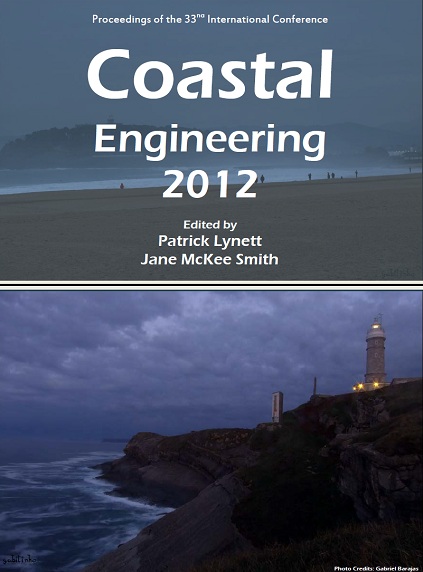Abstract
Wave breaking over submerged topographic obstacles leads to vorticity generation and, at times, to the generation of strong offshore-directed rip currents. The generation of finite-length breakers may also be induced by the positive interaction of wave trains propagating to shore with a relative angle. Such an interaction gives rise to a short-crested system, this, in turn, generating both breakers of finite crossflow length and an intense associated vorticity. We here analyze such a vorticity generation mechanism specifically focusing on the location where wave breaking occurs. To this purpose we use both a simple theoretical approach, based on the well-known theory of wave ray propagation, and ad-hoc numerical simulations, by means of a NSWE (Nonlinear Shallow Water Equations) solver. A fair comparison between such preliminary theoretical and numerical results suggests that the present work can be used as the basis for future analyses of vorticity generation by cross seas.References
Antuono, M., L. Soldini, and M. Brocchini. 2012. On the role of the Chezy frictional term near the shoreline, Theoretical and Computational Fluid Dynamics, 26, 105-116.http://dx.doi.org/10.1007/s00162-010-0220-8
Brocchini, M., R. Bernetti, A. Mancinelli, and G. Albertini. 2001. An efficient solver for nearshore flows based on the WAF method, Coastal Engineering, 43, 105-129.http://dx.doi.org/10.1016/S0378-3839(01)00009-6
Brocchini, M., A.B. Kennedy, L. Soldini, A. Mancinelli. 2004. Topographically controlled, breakingwave-induced macrovortices. Part 1. Widely separated breakwaters, Journal of Fluid Mechanics, 507, 289-307.http://dx.doi.org/10.1017/S002211200400878X
Craig, W., and D.P. Nicholls. 2002. Traveling gravity water waves in two and three dimensions, European Journal of Mechanics B/Fluids, 21, 615-641.http://dx.doi.org/10.1016/S0997-7546(02)01207-4
Dean, R.G. 1968. Breaking wave criteria; a study employing a numerical wave theory, Proceedings of the 11 th International Conference on Coastal Engineering, 108-123.
Fowler, R.E., and R.A. Dalrymple. 1990. Wave group forced nearshore circulation, Proceedings of 22 nd International Conference on Coastal Engineering, ASCE, 729-742.
Hammack, J., D.M. Henderson, and H. Segur. 2005. Progressive waves with persistent two-dimensional surface patterns in deep water, Journal of Fluid Mechanics, 532, 1-52.http://dx.doi.org/10.1017/S0022112005003733
Kennedy, A.B., M. Brocchini, L. Soldini, E. Gutierrez. 2004. Topographically controlled, breakingwave-induced macrovortices. Part 2. Changing geometries, Journal of Fluid Mechanics, 559, 57-80.http://dx.doi.org/10.1017/S0022112006009979
Madsen, P.A., O.R. Sørensen, and H.A. Schäffer. 1997. Surf zone dynamics simulated by a Boussinesq type model. Part I. Model description and cross-shore motion of regular waves, Coastal Engineering, 32, 255-287.http://dx.doi.org/10.1016/S0378-3839(97)00028-8
Mei, C.C. 1983. The applied dynamics of ocean surface waves, Wiley-Interscience, 740 pp.
PMCid:1198980
Shi, F., J.T. Kirby, J.C. Harris, J.D. Geiman, and S.T. Grilli. 2012. A high-order adaptive time-stepping TVD solver for Boussinesq modelling of breaking waves and coastal inundation, Ocean Modelling, 43-44, 36-51http://dx.doi.org/10.1016/j.ocemod.2011.12.004
Silvester, R. 1974. Coastal Engineering II, Elsevier, Amsterdam, 338 pp.
Whitham, G.B. 1974. Linear and nonlinear waves, John Wiley & Sons, New York.

